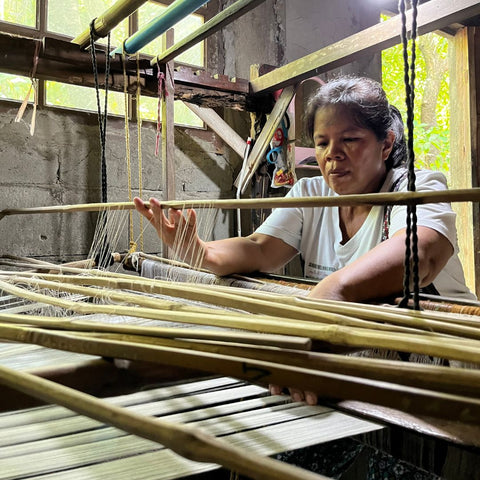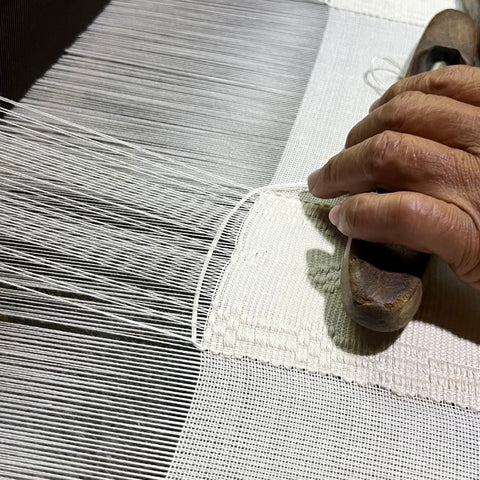Our special series 'Weaver of the Month' features the dedicated artisans who made your weaves. Read all weavers’ stories here.
Threads of mastery
Amalia Toledo started her weaving journey in 2006 at the age of 33 when she joined the Salngan Livelihood Multi-Purpose Cooperative (SLMPC). SLMPC was founded to provide livelihood opportunities to the women of Oton, Iloilo, enabling mothers like Amalia to take better care of their children.
Over the years, Amalia has honed her expertise to become a master of the pick-up weaving technique which allows her to create intricate designs with the handloom.
Unlocking new opportunities through weaving
Her path to weaving was guided by Taytay Sa Kauswagan, Inc. (TSKI), a non-profit organization dedicated to community development through microfinance services. Amalia recalls that she was part of the second batch of weavers trained by TSKI, and expressed her gratitude to the organization for helping establish the cooperative's foundation.
With both Amalia and her husband contributing to the household income, weaving helped them to buy their own house and property and fund their children's education.
In addition to this, being a weaver allows Amalia to spend time with family since she works from the comfort of her home. The same is true for most weavers—out of 26 SLMPC looms, only 3 are in the cooperative’s main building due to limited space. The rest are in weavers' homes, including Amalia who has a floor loom installed in her house.
Related article: Hablon Weaving in Iloilo
Elevating textile designs with new techniques
Amalia is the first among SLMPC members to master pick-up weaving. This weaving technique involves selecting specific warp yarn and picking them up individually or in groups using sticks or a similar tool. By manipulating these yarns in combination with the regular weft, the weaver can produce complex and detailed designs on the fabric.


Pick-up weaving requires a high level of skill, precision, and patience, as the weaver must carefully select and lift the warp threads to achieve the desired pattern.
Using this technique, Amalia expertly weaves a human-shaped pattern into the Panublix Polo Barong Cotton Hablon to create a design reminiscent of the traditional Filipino Barong.
Envisioning the future of SLMPC
Amidst the evolving landscape of tradition and modernity, Amalia envisions a positive future for the cooperative and hopes that SLMPC will continue to grow. She draws inspiration from the unwavering dedication of its members, especially the older members who still dedicate time to hone their craft.
Weaving digital bridges with Panublix
A look behind the looms shows the central role of weaving artisans in safeguarding cultural heritage and spurring economic growth in their communities. The distinctive human-shaped pattern of the Polo Barong Cotton Hablon pays homage to this rich legacy of hablon weaving, symbolizing artisans like Amalia at the heart of its creation.
Driven by the vision of a regenerative future, Panublix connects weavers and designers with eco-fibers, yarns, and textiles through an impact-driven digital sourcing platform. We provide weaving communities like SLMPC with digital economy support, connect them with training programs, and help them access materials made from natural fibers like cotton, abaca, and pineapple.
Read more about Salngan Livelihood Multi-Purpose Cooperative (SLMPC)
Discover: Iloilo Pre-Cut Polo Barong Cotton Hablon with Pattern

|
Stay tuned for monthly features about our partner artisans! Next month, we’ll feature Ma’am Anilene Tijing, a member of Indag-an Livelihood Multi-Purpose Cooperative. Follow us on social media (Facebook, Instagram, Linkedin) or subscribe to our newsletter to stay updated on the latest stories. |



